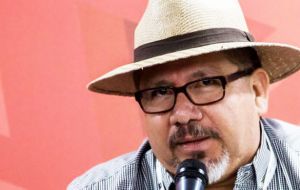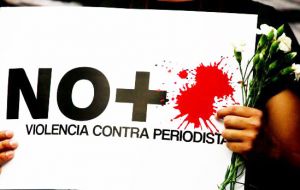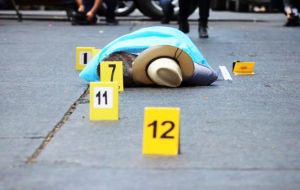MercoPress. South Atlantic News Agency
Mexico and US journalists demand justice following the killing of Valdez Cardenas
 Valdez Cardenas was one of the founders of Riodoce, a local publication in Sinaloa, as well as a contributor for the national newspaper, La Jornada.
Valdez Cardenas was one of the founders of Riodoce, a local publication in Sinaloa, as well as a contributor for the national newspaper, La Jornada.  On Tuesday morning, journalists took to the streets of Sinaloa with banners saying “We Demand Justice...Not One More Journalist,” to protest the killing.
On Tuesday morning, journalists took to the streets of Sinaloa with banners saying “We Demand Justice...Not One More Journalist,” to protest the killing.  “We have no doubt: those who ordered the crime asked the hit men to ensure the target,” stated Riodoce. They shot him 12 times with two different weapons.
“We have no doubt: those who ordered the crime asked the hit men to ensure the target,” stated Riodoce. They shot him 12 times with two different weapons. Journalists in the U.S. and Mexico are reeling from the death of Mexican reporter Javier Valdez Cardenas, who was shot dead on Monday in the Mexican state of Sinaloa, where he lived and worked. Valdez Cárdenas was an internationally recognized journalist who specialized in reporting on drug-trafficking and organized crime in Mexico.
Valdez Cardenas was one of the founders of Riodoce, a local publication in Sinaloa, as well as a contributor for the national newspaper, La Jornada. He also authored several books on the drug trade in Mexico.
On Tuesday morning, journalists took to the streets of Sinaloa with banners saying “We Demand Justice...Not One More Journalist,” to protest the killing.
On Monday, in an editorial titled “They hit us in the heart,” the Riodoce editors wrote, “It's a devastating blow to us, his family, but also to journalism, in Sinaloa, in Mexico, and especially for those who investigate, write and publish in freedom.”
The publication reported that Valdez was leaving the publication's office in broad daylight when the shooting occurred only a block away from the office. Attackers made it look like they were going to steal his car but then shot him 12 times with two different weapons.
“We have no doubt: those who ordered the crime asked the hit men to ensure the target,” stated Riodoce. They also said they “had no doubt” that his fatal shooting was due to “his work.”
Valdez Cardenas was last seen carrying his cell-phone and laptop, said fellow reporters, neither of which were found in his car.
Valdez is at least the sixth journalist to be murdered in Mexico since March. The country has become one of the deadliest in the world for those who work in the media. According to the Committee to Protect Journalists (CPJ), at least 40 journalists have been killed in Mexico since 1992 for reasons related to their work. Another 50 have been killed during the same time period for reasons not yet confirmed.
Sinaloa has long been a drug trafficking center in Mexico and home to the Sinaloa drug cartel, headed by the notorious Joaquin “El Chapo” Guzman. Experts say that Guzman's arrest last year and extradition in January have led to upheaval in the area as rival factions war for control of the gang.
Valdez was aware of the dangers of reporting on the drug trade. The CPJ reported that, in the weeks before his murder, Valdez told the CPJ that he was concerned for his safety. Earlier this month, CPJ released a report, “No excuse: Mexico must break cycle of impunity in journalists' murders”, about the violence against journalists in the country.
La Jornada reported that Valdez Cárdenas had received multiple anonymous death threats within the last three months. In a previous interview with NBC News, the slain journalist was asked why he didn't seek asylum in the U.S. Valdez responded that “someone has to tell the world what's happening in my country.”
President Enrique Peña Nieto took to Twitter to condemn what he said was an “outrageous crime.” He also tweeted: “I reiterate our commitment to freedom of expression and the press, fundamental for our democracy.”
The National Association of Hispanic Journalists (NAHJ) said in an email that more must be done to protect reporters in Mexico. “Today and every day we stand with our journalists across the border. We are simply doing our jobs,” said NAHJ Brandon Benavides to NBC Latino via email.
“The Mexican Government must do more to protect journalists and prosecute those criminals who kill journalists for doing their jobs,” stated Benavides. “In 2016, we saw the highest number of journalist assassinations in more than a ten year period. This year, we're facing an unacceptable continuation of these assassinations.”




Top Comments
Disclaimer & comment rulesCommenting for this story is now closed.
If you have a Facebook account, become a fan and comment on our Facebook Page!